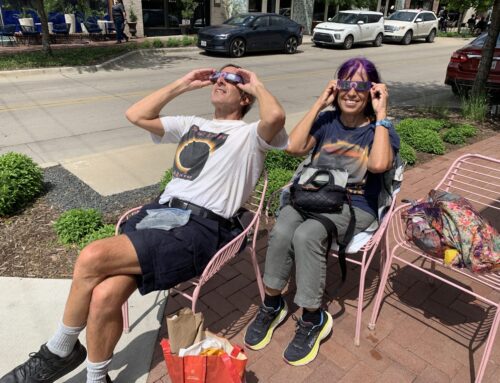When American people think of Africa, their view of the continent can often be negative. Images of poverty, famine, wars, and AIDS gathered from television news programs fill their minds. Bandele Tyehima, a.k.a. “Brother Bandele,” of the Pan-African Connection seeks to change that by showcasing Africa’s positive contributions to humankind.
From inside his expansive corner storefront on East Jefferson Boulevard, Brother Bandele presides over a veritable treasure trove of African art as well as books on African culture, politics and history. Wooden masks stretch up the store’s walls to the high ceilings inside while tables, chairs and sculptures inhabit all available floor space. Clothes and jewelry from various regions of Africa burst from shelves and hang from crowded racks in an adjoining room. Bookshelves pile high with books on myriad Africa-related themes in back corners of the shop. Large, imposing wooden carvings even beckon passersby from the sidewalk outside.
Brother Bandele speaks knowledgeably about all of the items in his store. He should. In the 18 years he has operated the Pan-African Connection, Brother Bandele estimates that he has visited Africa roughly 50 times to personally buy the items he sells. Items come from artists or dealers from places like Ghana, Ivory Coast, Togo, Nigeria, Senegal, Guinea-Bissau, Ethiopia and Kenya. And the Pan-African Connection’s clientele is just as varied. Brother Bandele counts people from China, Japan, Europe, the Caribbean and all over the Dallas Metroplex as his regular customers, whether they be art collectors or simply individuals looking to decorate their homes. Brother Bandele prides himself on having art “for everybody” — from simple $10 wooden masks to museum-quality pieces going for several thousand dollars.
Having art for everybody is one of the reasons the Pan-African Connection is located in Oak Cliff. Having started out as a bookstore near the corner of Beckley and Jefferson while Brother Bandele was still working full-time in the electronics industry, the Pan-African Connection has been open for business at its current location for 12 years. What started as a bookstore with art on the walls eventually drew enough buying-interest to become a full-fledged art retailer. Brother Bandele wanted to keep the store south of the Trinity so that his art and books could be more accessible, noting that if he moved to Highland Park, for example, he would simply be removing himself from the very community that supports the store.
Brother Bandele points out that since all art has the same human base, one can find the same elements of symbolism appearing in unrelated ethnic groups. For instance, birds and snakes often symbolize the same things across different cultures, he says. But one of the things that makes African art unique is the fact that it tends to be integrated into people’s lives. For example, the Dogon people of Mali carve elaborate wooden ladders to be used in everyday life but also refer to them as symbols of equality. Mud cloth is employed in the creation of everyday clothing rich with clever designs. And across West Africa, carved wooden masks are incorporated into rituals, dances and moral instruction.
Brother Bandele affirms that he has gotten an “education” since he began selling African art and hopes that others can benefit from the knowledge intrinsic in the items he sells. He points to a behemoth of a carving near one of the front windows and says that nearly everyone who comes through his door is somehow influenced by the piece. Brother Bandele explains that a lot of information is stored in art and that art, by nature, reinforces certain values. With inventory like Brother Bandele’s, it’s easy to see how setting up shop in Oak Cliff and offering up art that is accessible in any price range can delight the senses and educate the minds of anyone who ventures inside the store. The Pan-African Connection has been able to harness and exhibit the positive aspects of Africa’s contributions to the world, and even offers classes in African history and dance. The best part is that you can also take some of it home with you.





